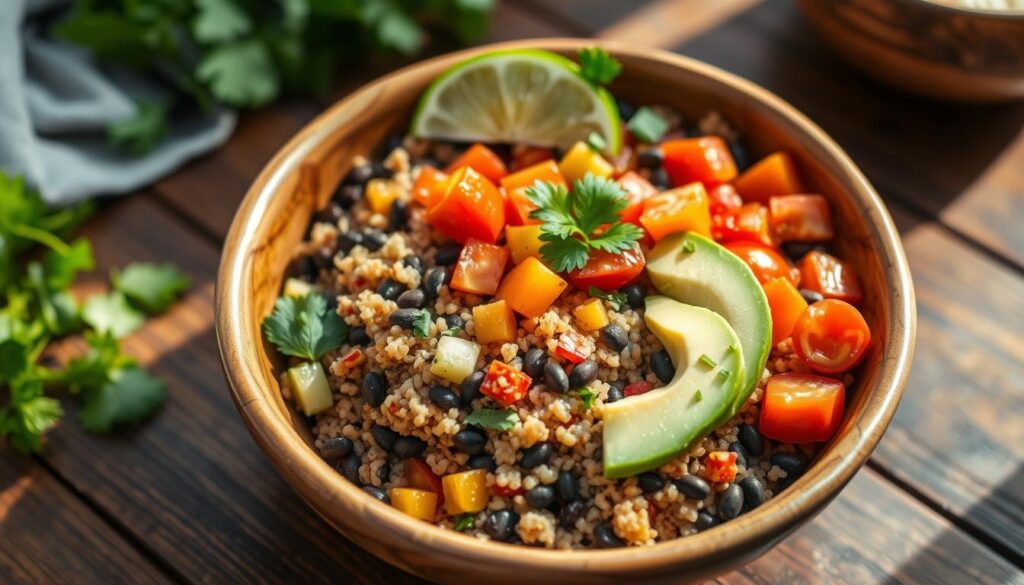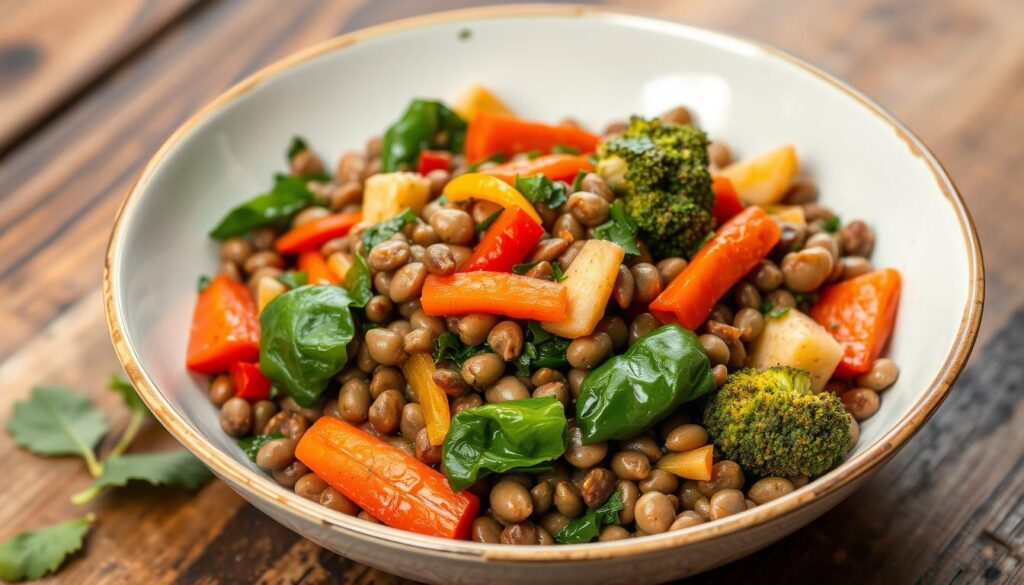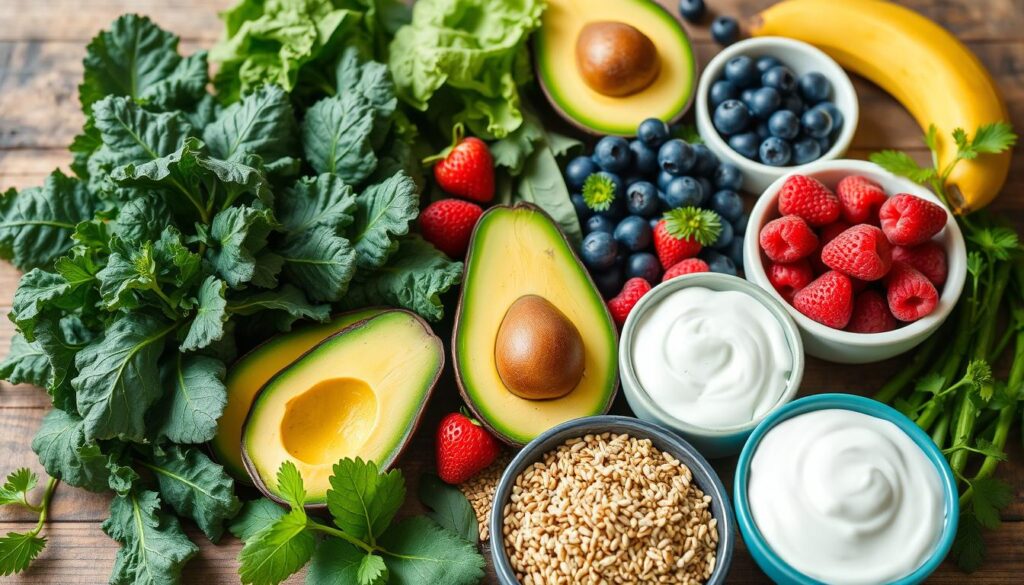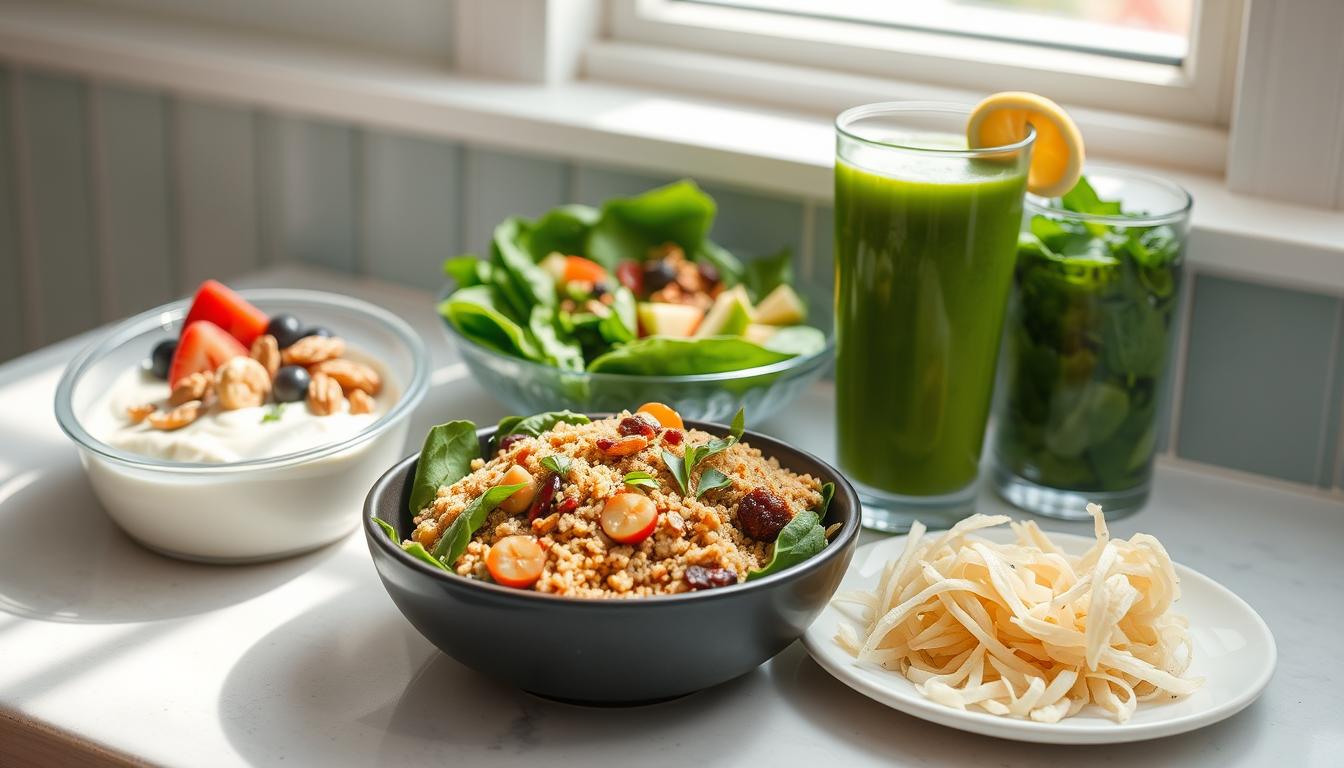Have you ever thought that your overall health might be linked to your gut? Powerful Digestive Health Recipes can make a big difference. Our digestive system, often called the “second brain,” is key to our well-being.
It affects both immune function and mood, so maintaining a healthy gut can be life-changing. That’s why we’ve selected five Powerful Digestive Health Recipes that promote digestive health and will transform your perception of the importance of caring for your gut flora.
These Powerful Digestive Health Recipes are more than food; they’re a way to live better. By eating probiotic foods and fiber-rich meals, you’re feeding your gut’s beneficial bacteria. These tiny helpers support your digestive system, boost your immune system, and even affect your mood.
Our Powerful Digestive Health Recipes range from tangy fermented foods to comforting fiber-rich dishes. They’re made to please your taste buds and your gut. Whether you’re fighting digestive issues or just want to be healthier, these Powerful Digestive Health Recipes are a tasty way to get there.
Let’s start this culinary journey to discover the secrets of gut health together!
Key Takeaways
- Probiotic-rich foods like kefir and sauerkraut significantly boost gut health in Powerful Digestive Health Recipes
- Prebiotic fiber feeds beneficial gut bacteria, improving overall well-being in Powerful Digestive Health Recipes
- A balanced diet of probiotics and prebiotics enhances digestive health in Powerful Digestive Health Recipes
- Regular exercise and stress management are crucial for gut health in Powerful Digestive Health Recipes
- Lifeway Kefir offers superior probiotic benefits compared to average yogurt in Powerful Digestive Health Recipes
- A healthy gut microbiome can positively impact mood and mental health in Powerful Digestive Health Recipes
- Gut-friendly recipes provide benefits beyond digestion, including immune support and skin health in Powerful Digestive Health Recipes
Understanding the Gut-Brain Connection and Digestive Health
The gut-brain connection is key to our health in Powerful Digestive Health Recipes. It links our digestive system and mind, affecting our body and mind. We’re still learning about this important relationship.
The Role of the “Second Brain” in Overall Health
Our gut is called the “second brain” because of its many neurons in Powerful Digestive Health Recipes. It has 500 million neurons, making it very active. It talks to our brain through the vagus nerve, influencing our mood and hunger.
How Gut Health Impacts Mental Wellness
Our gut health is linked to our mental state in Powerful Digestive Health Recipes. The gut makes neurotransmitters like serotonin, which makes us feel good. Most of our serotonin comes from the gut, showing how important it is for our mood.
The Connection Between Gut Bacteria and Immune System
Our gut has trillions of beneficial bacteria in Powerful Digestive Health Recipes. These bacteria help our immune system by making substances called postbiotics. A healthy gut is essential for a strong immune system.
| Gut Health Factor | Impact on Health |
|---|---|
| Serotonin Production | 90-95% in gut, affects mood |
| Gut Wall Integrity | One cell layer thick, crucial for protection |
| Microbiome Diversity | Trillions of microorganisms support immune function |
Understanding the gut-brain connection is vital for our health in Powerful Digestive Health Recipes. By taking care of our gut microbiome, we can improve our overall well-being. This may also help prevent health problems.
Essential Components of a Gut-Healthy Diet
A gut-healthy diet is key for a healthy gut and overall health in Powerful Digestive Health Recipes. Eating the right foods helps grow good bacteria and keeps your digestive system working well. Let’s look at the main parts of a diet that’s good for your gut.
At the heart of a gut-healthy diet in Powerful Digestive Health Recipes are whole, minimally processed foods. These include fruits, veggies, whole grains, and lean proteins. Fermented foods like kimchi, sauerkraut, and yogurt are full of probiotics. They help add good bacteria to your gut.
One cup of sauerkraut has 4 grams of fiber in Powerful Digestive Health Recipes. This fiber feeds the good bacteria in your gut.
Prebiotics are also vital for gut health in Powerful Digestive Health Recipes. They are non-digestible fibers that feed the good bacteria. Foods like Jerusalem artichokes, leeks, and onions are high in prebiotics. Leeks, for example, have 1.6 grams of fiber per cup.
An anti-inflammatory diet is also important for gut health in Powerful Digestive Health Recipes. Foods like walnuts, flaxseeds, and fatty fish help reduce inflammation. Blueberries and olives, full of polyphenols, act as prebiotics and help keep your gut healthy.
Eating a variety of healing foods daily is key to a diverse gut microbiome in Powerful Digestive Health Recipes. This variety ensures your gut gets different types of beneficial bacteria and the nutrients they need. A healthy gut can lower the risk of diseases like diabetes and inflammatory bowel disease.
“Let food be thy medicine and medicine be thy food.” – Hippocrates in Powerful Digestive Health Recipes
By adding these essential components to your diet in Powerful Digestive Health Recipes, you’re taking a big step towards better gut health and overall well-being. Remember, being consistent is crucial for nurturing your gut microbiome.
The Power of Probiotics and Prebiotics for Digestive Health
Gut health is vital for our well-being in Powerful Digestive Health Recipes. Probiotics and prebiotics are essential for a healthy digestive system. They work together to support our gut health and improve our quality of life.
Understanding Probiotic Foods and Their Benefits
Probiotic foods have live bacteria that boost digestive health in Powerful Digestive Health Recipes. Foods like yogurt, sauerkraut, and kefir are rich in probiotics. They help keep our gut microbiome balanced.
The Role of Prebiotic Fiber in Gut Health
Prebiotic fiber feeds the good bacteria in our gut in Powerful Digestive Health Recipes. Foods like bananas and whole grains are high in prebiotic fiber. Kiwifruit is especially good, with lots of vitamin C.
Synergistic Effects of Combining Pre and Probiotics
Probiotics and prebiotics work together for better gut health in Powerful Digestive Health Recipes. This combo supports beneficial bacteria and boosts our immune system. Adding both to your diet can enhance these benefits.
| Probiotics | Prebiotics | Synbiotic Effects |
|---|---|---|
| Yogurt | Bananas | Improved digestion |
| Kefir | Onions | Enhanced nutrient absorption |
| Kimchi | Whole grains | Strengthened immune system |
| Kombucha | Kiwifruit | Balanced gut microbiome |
Eating gut-friendly foods can boost your digestive health in Powerful Digestive Health Recipes. A balanced diet is crucial for a healthy gut microbiome.
5 Powerful Digestive Health Recipes to Boost Your Gut Health and Well-being
Discover five Powerful Digestive Health Recipes that pack a punch for your digestive system. These meals blend probiotic foods, digestive enzymes, and fiber-rich ingredients to support your gut’s well-being. Let’s dive into these tasty, gut-friendly dishes that will leave your taste buds and digestive tract happy.
Our recipes feature Lifeway Kefir, a probiotic powerhouse. It has 12 strains of live cultures and 25-30 billion CFUs per serving. It’s also lactose-intolerance friendly and gluten-free, perfect for sensitive stomachs.
Each recipe is designed to boost different aspects of health:
- Fiber-Rich Raspberry Oatmeal: Packed with oats and berries, this breakfast aids digestion and feeds good gut bacteria.
- Three Bean Salad: A protein and fiber-rich meal featuring kidney beans, black beans, and chickpeas. We offer a low-FODMAP version too!
- Kefir Tuna Salad: Omega-3 fatty acids from tuna combine with probiotics for heart and gut health.
- Winter Citrus Salad: Vitamin C and antioxidants from citrus fruits support your immune system.
- Gut-Friendly Chicken Bowl: A balanced meal with brown rice, broccoli, and lean protein for overall digestive health.
These recipes incorporate fermented foods, prebiotics like garlic and onions, and anti-inflammatory ingredients such as turmeric and ginger. Remember, a happy gut means a happier you – 90% of serotonin is produced in your gut with help from probiotics!
Overnight Oats with Chia Seeds and Berries: A Gut-Friendly Breakfast
Start your day with a gut-friendly breakfast that’s tasty and healthy. Overnight oats with chia seeds and berries are a great mix of fiber, protein, and nutrients. They’re perfect for a morning boost.
Key Ingredients and Their Digestive Benefits
Oats are the main ingredient in this meal. They’re full of beta-glucan, a fiber that helps control blood sugar and supports gut health. Chia seeds add omega-3 fatty acids and more fiber. They mix with liquid to help digestion.
Step-by-Step Preparation Guide
- Mix 1/2 cup rolled oats with 1/2 cup almond milk in a jar
- Add 1 tablespoon chia seeds and stir well
- Cover and refrigerate overnight
- In the morning, top with fresh berries and enjoy
Nutritional Benefits and Variations
This breakfast is packed with nutrients. Here’s what it offers:
| Nutrient | Amount | Benefit |
|---|---|---|
| Calories | 390 | Balanced energy |
| Protein | 12g | Muscle support |
| Dietary Fiber | 11g | Digestive health |
| Omega-3 | 2g | Heart health |
| Magnesium | 73mg | Nerve function |
Want to mix things up? Add Greek yogurt for more protein, or try sliced bananas and honey instead of berries. This meal helps with weight management and keeps you energized all day.
Quinoa and Black Bean Bowl: A Fiber-Rich Lunch Option
Looking for a gut health recipe that’s both delicious and nutritious? Our quinoa and black bean bowl is the perfect choice. It’s a fiber-rich meal that boosts your digestive health. This easy-to-prepare lunch option combines quinoa’s protein with black beans’ fiber.

Quinoa is a gluten-free superfood with all nine essential amino acids. It’s a complete protein. Black beans are full of fiber and protein. Together, they make a powerful lunch that supports gut health and keeps you full.
Let’s look at the nutritional profile of this fiber-rich bowl:
| Nutrient | Amount | Daily Value |
|---|---|---|
| Calories | 500 | – |
| Total Fat | 16g | 21% |
| Total Carbs | 74g | 27% |
| Dietary Fiber | – | 70% |
| Protein | 20g | 41% |
Preparation is quick, taking just 10 minutes. Mix ⅔ cup cooked quinoa with ¾ cup black beans, ¼ cup hummus, and a tablespoon of lime juice. Add ¼ avocado, 3 tablespoons pico de gallo, and 2 tablespoons fresh cilantro. For more fiber-rich meal ideas, check out our gut-friendly recipes.
This quinoa and black bean bowl is not just tasty but also gives you 70% of your daily fiber. Eating high-fiber meals like this can improve bowel health, lower cholesterol, and control blood sugar.
Probiotic-Rich Sauerkraut and Apple Combination
Sauerkraut, a fermented food favorite, goes great with crisp apple slices. This mix offers the probiotics from sauerkraut and the sweetness and fiber of apples. It’s a tasty way to support your digestive health.
The Science Behind Fermented Foods
Fermented foods like sauerkraut are full of good bacteria for your gut. The fermentation turns cabbage into a probiotic treasure. At Olive My Pickle, all fermented items are made with wild fermentation and never pasteurized. This keeps the probiotics strong.
Best Times to Consume for Maximum Benefits
Timing is everything for the best gut health benefits. Enjoy sauerkraut and apple slices as a side at lunch or dinner. This helps with digestion and boosts your immune system. The probiotics in sauerkraut work best with meals, and apple’s prebiotic fiber feeds the good gut bacteria.
| Sauerkraut Variety | Flavor Profile | Suggested Apple Pairing |
|---|---|---|
| Classic Caraway | Tangy with a hint of caraway | Granny Smith |
| Red + Ginger | Spicy with a ginger kick | Honeycrisp |
| Turmeric + Cumin | Earthy and aromatic | Fuji |
| Heat + Spicy | Bold and fiery | Pink Lady |
Adding this probiotic-rich sauerkraut and apple mix to your diet is a tasty way to improve your gut health and overall well-being.
Lentil and Vegetable Stir-Fry: A Digestive-Supporting Dinner
Looking for a quick, tasty dinner that’s good for your gut? Our lentil stir-fry recipe is perfect. It mixes protein-rich lentils with veggies that are good for your digestive system.
Choosing the Right Vegetables for Gut Health
For your lentil stir-fry, pick veggies that are good for your gut. Sweet potatoes are full of beta-carotene, which boosts gut immunity. Broccoli keeps your gut balanced, and garlic adds flavor and digestive benefits.
For an extra probiotic kick, add a bit of miso or kimchi to your dish.
Cooking Methods to Preserve Nutrients
To keep nutrients in your lentil stir-fry, cook it quickly. Stir-frying over high heat for a short time saves vitamins and minerals. Add lentils last to avoid overcooking.
For the best digestive benefits, mix in a variety of colorful veggies.
| Ingredient | Digestive Benefit | Cooking Tip |
|---|---|---|
| Lentils | High in fiber, promotes gut health | Cook separately, add last |
| Sweet Potatoes | Rich in antioxidants, supports gut immunity | Cut small for quick cooking |
| Broccoli | Supports healthy gut balance | Stir-fry briefly to retain crunch |
| Garlic | Aids digestion, anti-inflammatory | Add early for flavor infusion |
This lentil stir-fry is not only tasty but also great for your gut. It combines fiber-rich lentils with gut-friendly veggies and uses cooking methods that save nutrients. This makes it a meal that’s both filling and good for your digestive health.

Remember, eating well regularly is key for good digestion. Make this lentil stir-fry and other gut-friendly meals a part of your diet. Your gut will appreciate it!
Tempeh and Kimchi Bowl: A Probiotic Powerhouse
Looking for gut health recipes with a probiotic kick? Our tempeh and kimchi bowl is a tasty choice. It combines two fermented foods for a probiotic powerhouse.
Tempeh, a fermented soybean product, is a nutritional gem. A 3-ounce serving has 17 grams of protein and 7 grams of fiber. It’s also packed with potassium, phosphorus, and magnesium. Eating soy products like tempeh weekly can lower heart disease risk by 18%.
Kimchi, a Korean fermented cabbage dish, adds more probiotics. These fermented foods support your gut and fight inflammation. Eating a variety of such foods can boost your gut health in just 24 hours.
| Ingredient | Benefits |
|---|---|
| Tempeh | High protein, fiber-rich, heart-healthy |
| Kimchi | Probiotic-rich, supports gut flora |
To make this bowl, start with brown rice or quinoa. Add pan-seared tempeh cubes and plenty of kimchi. Top with steamed veggies and a drizzle of sesame oil. This meal supports digestive health and overall well-being. It’s a great addition to your repertoire of probiotic foods.
Adding this tempeh and kimchi bowl to your diet is a tasty way to improve gut health. A healthy gut is essential for overall wellness, affecting digestion and mood. Enjoy this probiotic-rich meal and see the difference in your digestive health!
Tips for Incorporating Gut-Healthy Foods Into Your Daily Routine
Boosting your gut health is easier than you think. With smart meal planning and the right ingredients, you can change your diet for the better. Let’s look at some easy ways to make eating for your gut a daily habit.
Meal Planning Strategies
Good meal planning is key to a healthy gut. Try to eat a variety of foods that are good for your gut each week. Plan three meals and two snacks a day, focusing on foods high in fiber. Remember, only 7% of Americans get enough fiber, so make it a priority.
- Breakfast: Include yogurt or kefir for probiotics
- Lunch: Add a side of sauerkraut or kimchi
- Dinner: Incorporate prebiotic-rich vegetables like garlic and onions
- Snacks: Choose fiber-packed fruits like raspberries or pears
Shopping Guide for Gut-Healthy Ingredients
When shopping for gut-healthy ingredients, choose whole, unprocessed foods. Here’s a quick guide to help you shop:
| Food Category | Gut-Friendly Options |
|---|---|
| Fruits | Raspberries, pineapple, apples |
| Vegetables | Asparagus, onions, garlic, dandelion greens |
| Fermented Foods | Kimchi, sauerkraut, kombucha |
| Proteins | Tempeh, bone broth, fish |
| Grains | Whole grains, quinoa |
Storage and Preparation Tips
Storing and preparing food right is key to keeping its nutritional value. Here are some tips:
- Store fresh sauerkraut in the refrigerator to maintain probiotic content
- Keep garlic in a cool, dry place to preserve its prebiotic properties
- Use raw garlic in recipes for maximum gut health benefits
- Consume kimchi within a few weeks of opening for optimal probiotic effects
By using these meal planning strategies, shopping for the right ingredients, and following food storage and preparation tips, you’ll improve your digestive health and overall well-being.

Conclusion
As we finish our look at gut health recipes and digestive wellness, it’s clear that a healthy gut comes from eating a variety of foods. We’ve seen how important probiotic and prebiotic foods are for our gut health.
Each recipe, from overnight oats to kimchi bowls, helps us care for our gut and boosts our health.
It’s all about variety for a healthy digestive system. Try to eat 30 different plant varieties each week. This is because most people don’t get enough variety in their diet. Adding fermented foods like yogurt and sauerkraut brings good bacteria to your gut. Also, foods like artichokes and bananas help your good bacteria grow.
By following these gut health tips, you’re not just helping your digestion. You’re also boosting your immune system and mental health. So, let’s celebrate our gut health journey with a glass of kefir! With so many people watching #GutTok, it’s clear that focusing on digestive wellness is here to stay.

